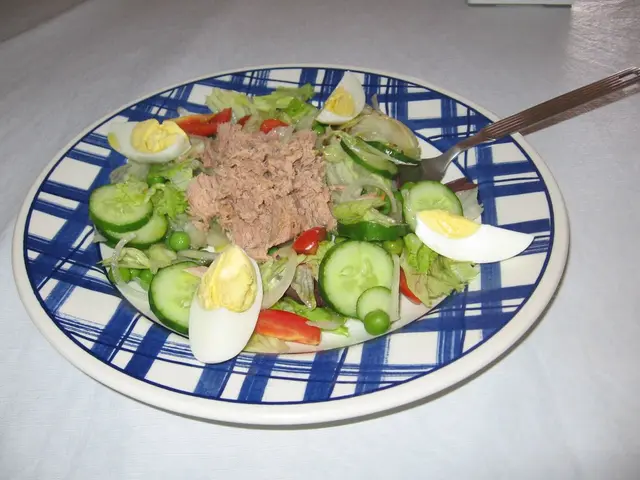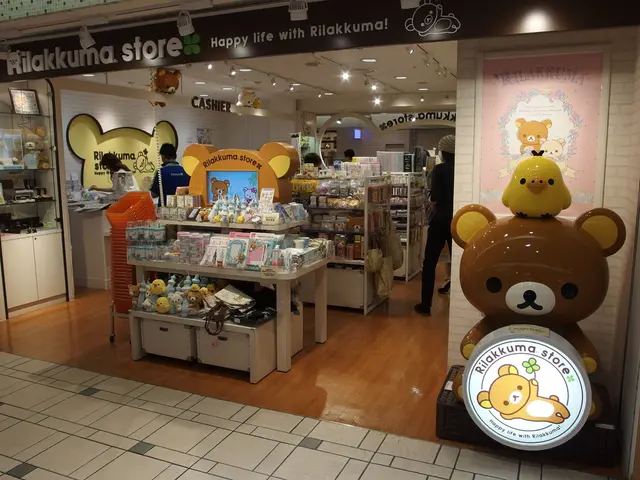Who's winning the Discount Grocery War in Germany?
Discount retailers engaged in fierce competition for market dominance - Discounts competing for dominance in the marketplace
Competition among discounter stores in Germany is fiercer than ever, with Aldi and Lidl taking the lead in price battles. In 2024, the combined turnover of the discount grocery sector surged by nearly a third compared to five years ago, amounting to approximately 77 billion euros, according to market research institute YouGov.
Besides Aldi and Lidl, other discount stores such as Penny, Netto, and Norma also experienced noticeable growth. The food retail sector expanded by 26.6% between 2019 and 2024, generating around 203 billion euros. Supermarkets like Edeka and Rewe also showed considerable growth during this period.
The rise of discount stores during the pandemic and the turbulent period marked by COVID-19 and the Russian invasion of Ukraine led both groups to gain market share. Currently, discount stores hold around 38% of the market, while full-range stores hold approximately 29%. Distribution channels and discount stores themselves face escalating competition, as detailed by YouGov expert Robert Kecskes.
Price Wars at Aldi and Lidl
The price war between Lidl and Aldi has gained traction in recent days. Lidl announced a massive price reduction on over 500 items across various product categories, slashing prices by up to 35% in some areas. Aldi followed suit, broadcasting that it had already reduced the prices on approximately 1,000 items permanently and planned to add hundreds more in the coming weeks. Customers can expect reduced prices on dairy products, meat and sausage products, frozen food, sweets, and cleaning agents, among other products. As Aldi wrote, "Being the price leader is not a temporary promotional tactic for us, but a fundamental principle."
Battles for Discount Market Share
Food prices soared to 36.5% higher than the 2020 average in May, according to the Federal Statistical Office. Retail expert Stephan Rüschen expects these price cuts to persist as retailers risk losing credibility if they were to secretly raise prices again. Lidl, in a bid to gain market share and seize the price leadership from Aldi, is driving this price competition among discounter stores.
Analysts like Kecskes regard the increased price wars in the discount sector as a strategic move to attract budget-conscious consumers. However, the price reductions don't apply to the entire range of products, but rather form part of a strategic plan to bring in new customers who are expected to purchase items with a higher profit margin.
Here are some key players that have taken center stage in Germany's discount grocery market:
- Aldi: Operating as Aldi Nord and Aldi Süd, Aldi comprises one of the largest discounter chains in Germany, holding a combined market share of over 20%. Aldi's success is underpinned by an emphasis on quality products at affordable prices, while expanding its product range to include organic and premium selection.
- Lidl: With a market share of around 10%, Lidl stands out for its extensive product range and competitive pricing.
- Netto and Penny: While specific market share figures are not available, Netto and Penny have established significant positions in the discount market, offering a variety of products with a strong focus on affordability and local options, respectively.
- Norma: Known for efficient operations and affordable prices, Norma also holds a stake in the discount grocery market, though detailed market share statistics are not provided.
- EC countries, with their emphasis on the freedom to provide services, have seen an influx of discount retail chains like Aldi, Lidl, and Norma, expanding across borders and flourishing in the competitive German industry and finance sectors.
- In the retail sector, as the demand for budget-friendly options increases, industry analysts foresee a continuous emphasis on the freedom to provide services, allowing retailers to deliver affordable prices and diversified product ranges, with the potential for growth in the discount grocery market.








